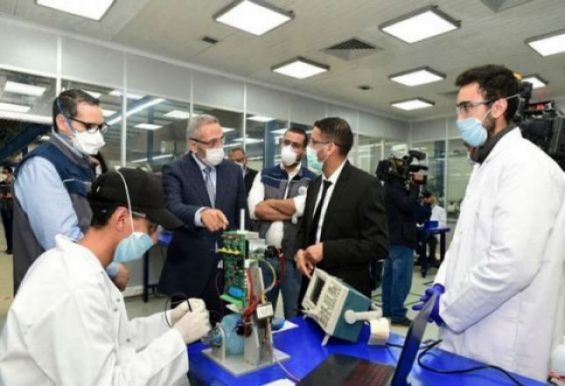The number of severe coronavirus cases admitted in Moroccan hospitals is on the rise. At least 34 Covid-19 patients are in a critical condition, according to recent data. The number is still far from saturating the resuscitation beds but brings back the debate on Morocco’s locally-made ventilators.
Expected to be ready by the end of April before an extension of the deadline, the made in Morocco ventilators are ready for use. Contacted by Yabiladi, a source within the Ministry of Industry, Trade, Green and Digital Economy said that ventilators manufactured under the supervision of Aviarail / SERMP were deemed operational.
Over time, several versions were designed. «The first one is a basic design that has been developed to deal with any possible pandemic wave, in case a large part of the health system had to be mobilized urgently. For this specific situation, it was indeed necessary to develop a version for eminently urgent cases with respiratory distress», the same source added.
A device with advanced artificial intelligence
Given the fact that «the country’s health system has not been flooded with numerous cases with breathing problems», the teams were asked to «go beyond the basics», the same source explained. «Hence the V2,V3 and V4 ventilators have been developed, with highly advanced technologies and functions, which meet international standards», according to the aforementioned source.
The objective is to go beyond the current emergency and consider other scenarios. The idea was to «be part of a medical ecosystem, to become autonomous and create an industry capable of manufacturing 100%-Moroccan medical equipment», so as to cover the country's needs even for the medium and long term.
Initially, a prototype breathing-bag was designed. The teams were able to produce a turbine version, with a device equipped with artificial intelligence so as to facilitate the monitoring of patients by the dedicated medical teams and to anticipate any acute respiratory difficulties, Saïd Benhajjou, Managing Director of Aviarail, told Yabiladi.
«These are ventilators that take into account the condition of a sick lung, which certainly needs assistance, but which must be helped to maintain oxygen in it, so that the lung tissues do not stick together».
A technology platform more advanced than mere respiratory assistance
As a result, this advanced device goes beyond respiratory assistance, with remote functions as well. «We have taken up the challenge of manufacturing a 100%-Moroccan ventilator : all the parts are made, designed and manufactured by Moroccan teams», said the same source from the Industry and Trade Ministry.
Moreover, a scientific committee, jointly appointed by the Ministries of Health and Industry, validated this prototype. In this sense, two presentations were delivered before a group of doctors and resuscitation experts. Last week, this prototype, 500 of which have been manufactured so far, obtained European CE certification, Saïd Benhajjou announced.
The same source indicates that the Ministry of Industry is designing a technological platform for the development of a medical device that will not only serve to respond to health emergencies, but also other functions, depending on the needs of health facilities in the country.
«We are relying on these experts and researchers to work alongside the ministries in charge on other products.These are the same companies that have developedmask manufacturing machines».
«The advanced technology respiratory assistance devices, designed by Avirail / SERMP, can be mobilized at any time according to the demand and the needs of health facilities in the Kingdom. They have been tested and are fully functional, and they meet international health standards», Yabiladi was told.




 chargement...
chargement...












